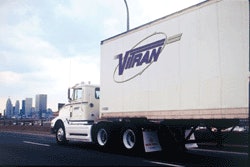Leading news, trucking market conditions and industry analysis
Legislators ask Obama to withdraw hours rewrite
President Obama should withdraw the Federal Motor Carrier Safety Administration’s proposed hours-of-service revision because its costs would hurt the U.S. economy, House Speaker John Boehner and Majority Leader Eric Cantor wrote Oct. 5 in a letter to Obama. “Current rules have led to record low levels of fatalities involving trucks,” Boehner and Cantor wrote, adding that the White House and Congress should work together to prevent a potential “$1 billion in regulatory burden.”
 Under the proposal, the Federal Motor Carrier Safety Administration is considering whether to reduce the daily driving limit from 11 hours to 10 hours.
Under the proposal, the Federal Motor Carrier Safety Administration is considering whether to reduce the daily driving limit from 11 hours to 10 hours.Their letter came two weeks after a similar Sept. 23 letter to Obama from House Transportation Committee Chairman John Mica. The Florida Republican wrote that the proposed rule would be an unnecessary and costly regulatory burden on truckers given the improved record of truck safety since the 2008 rule became effective.
Three other Republican committee members signed Mica’s letter: Tennessee’s John Duncan, Highway subcommittee chairman; Pennsylvania’s Bill Schuster, chairman of the Railroads, Pipelines and Hazardous Materials subcommittee; and Missouri’s Sam Graves, committee member and Small Business Committee chairman. Should FMCSA proceed with the new rule, the four House members would weigh options that could include hearings or legislation.
On Aug. 30, Obama responded to Boehner’s request to review pending regulations with compliance costs of more than $1 billion. Seven proposed rules qualified, including the HOS proposal at more than $1 billion and electronic onboard recorders at $2 billion. Soon after issuing that list, Obama withdrew the U.S. Environmental Protection Agency’s ozone proposal, which would have been by far the costliest at $19 billion to $90 billion.
The Owner-Operator Independent Drivers Association and the American Trucking Associations have said the proposal is costly and unnecessary since studies indicate safety improvements under the 2008 rule.
Meanwhile, Sen. Kelly Ayotte (R-N.H.) proposed to add language to the transportation appropriations bill (H.R. 2112) that would block the planned changes to the HOS regulations. The measure, Senate Amendment 754, states that “none of the funds made available under this heading may be used to finalize, enforce, or implement the hours-of-service regulations proposed by the Federal Motor Carrier Safety Administration on December 29, 2010.”
The trucking industry has used this tactic before to block implementation of an HOS rule. In 2000, Sen. Richard Shelby (R-Ala.), then a leader on the Transportation Appropriations subcommittee, sponsored similar language to block the Clinton administration’s proposed changes to the HOS rules that were opposed by virtually the whole trucking industry. Ayotte’s measure faces a somewhat tougher challenge than the 2000 effort because the language was not inserted by leadership at the committee level.
In 2009, FMCSA had entered into a settlement agreement with safety advocacy groups and the Teamsters union to revisit the 2008 rule and publish a revised rule. This agreement stipulates if the agency produces a “substantially different” rule from the current one, this “may” eliminate the need for further judicial review.
The U.S. Court of Appeals for the District of Columbia originally set the Federal Register publication deadline for July 26, which it later extended to Oct. 28. The agency sent the proposal to Transportation Secretary Ray LaHood Aug. 11. The Office of Management and Budget was to review it before publication.
ATA, TCA jointly seek increased productivity for trucks
Two trucking groups compromised on their previously differing policies on truck weight in an effort to establish that the trucking industry is unified on the need to improve truck productivity. The American Trucking Associations board of directors voted to expand ATA’s policy on truck productivity to endorse as an option an 88,000-pound five-axle combination with enhanced braking capability. ATA’s policy since 2006 has been to support 97,000-pound six-axle combinations, and the association also favors harmonization of regulations governing longer-combination vehicles.
In a directly related action, the Truckload Carriers Association’s board of directors approved a two-tiered truck productivity policy that supports 88,000 pounds on five axles as well as 97,000 pounds on six axles.
“The trucking industry, like any family, sometimes takes a while to reach a consensus, but we’re happy that we have been able to bring our respective policies on truck productivity in line,” said Bill Graves, ATA president and chief executive officer. “It is critical that we petition our elected leaders with one voice.”
Studies have shown that more productive trucks are safer, more efficient and “greener” than conventional combinations without causing more wear and tear on roads, said new ATA Chairman Dan England. “Now that we and TCA have come together on this issue, we’re in a better position to continue to make that case to policymakers.”
The two groups say heavier trucks still can comply with federal safety regulations.“Given the advances in brake technology, an 88,000-pound five-axle truck using enhanced brakes will meet federal rules limiting commercial vehicle stopping distance,” said TCA Chairman Gary Salisbury. “By amending our policies and compromising, TCA and ATA have set the trucking industry on the road to success.” – Avery Vise
IN BRIEF
U.S. Transportation Secretary Ray LaHood said he would not continue in that post if President Obama is re-elected for a second term. The Illinois Republican, who has been mentioned as a possible gubernatorial candidate in his home state, said there would be “wonderful opportunities” for him in 2013.
Indianapolis-based Celadon purchased a 6.3 percent stake in USA Truck Inc. on Oct. 11 and asked for a meeting to discuss a merger. Van Buren, Ark.-based USA Truck declined to meet.
Dallas-based Frozen Food Express Industries Inc., which is exiting the dry van business, reached an agreement to sell about 435 dry van trailers and 290 tractors to Celadon; terms were not announced.
Tampa, Fla.-based Quality Distribution subsidiary Boasso America will acquire Chesapeake, Va.-based Greensville Transport Co. for $8.5 million and up to an additional $500,000 subject to Greensville meeting certain performance criteria.
The Federal Motor Carrier Safety Administration fined Fremont, Ohio-based American Welding & Tank $3.876 million for manufacturing and selling unsafe nurse tanks, a type of cargo tank used to store and transport anhydrous ammonia used in farm operations.
The National Private Truck Council and Instructional Technologies Inc. launched Private Fleet Management Online, an enhanced interactive training curriculum for private fleet managers that replaces NPTC’s Fleet Learning Center.
Fort Smith, Ark.-based ABF Freight System received the 2011 Excellence in Security Award from the American Trucking Associations’ Supply Chain Security and Loss Prevention Council.
Roehl Transport Inc. and Stagecoach Cartage and Distribution were winners of the 2011 Volvo Trucks Safety Award. Roehl, of Marshfield, Wis., won in the over 20 million mile category, and Stagecoach, of El Paso, Texas, won in the under 20 million mile category.
Heartland Express founder and longtime chairman and chief executive officer Russell Gerdin died Oct. 14. Gerdin, who was 70, recently had retired from the North Liberty, Iowa-based company due to health reasons.
The Agricultural and Food Transporters Conference of American Trucking Associations hired agricultural lobbyist Jon Samson as its new executive director, replacing Russell Laird, who left AFTC earlier this year.
Nominations for The Goodyear Tire & Rubber Co.’s 29th annual North America Highway Hero program will be accepted until Nov. 30. For nomination forms, go to www.goodyeartrucktires.com/newsroom/highway-heroes/hero-overview.aspx.
Arrow Truck Sales launched its fifth Back On The Road program with a new presenting sponsor: Mack Trucks Inc. The winner will receive a one-year lease on a 2008 Mack Pinnacle, a one-year work agreement with Heartland Express and other products and services. For more information, go to www.arrowtruck.com/backontheroad.
NTTC says halt two rulemakings

NTTC President John Conley said LaHood can provide political cover to the Pipeline and Hazardous Materials Safety Administration, which developed the wetlines regulation in response to pressure from a congressional committee. PHMSA began the other rulemaking that would abdicate key government safety responsibility if the petitions from two private groups are granted, Conley said.
“Neither of these regulations was actually initiated by your agency for safety reasons, but rather were the result in one case from intense congressional pressure and in the other in response to petitions from an industry group that would financially benefit greatly if its petitions are granted,” Conley wrote to LaHood.
Conley told LaHood that U.S. Rep. Bill Shuster (R-Pa.) – chairman of the House Transportation and Infrastructure Committee Subcommittee on Railroads, Pipelines and Hazardous Materials – and ranking member U.S. Rep. Corrine Brown (D-Fla.) both have urged PHMSA Administrator Cynthia Quarterman to set aside the wetlines rulemaking that resulted from pressure from certain members of the T&I Committee in the last Congress and is not an issue of interest to the majority of the current Congress.
Regarding the proposal to turn over regulatory responsibilities to a private entity through a “no-bid” process, Conley told LaHood that “while we can respect the gall of these parties to have the government mandate the purchase of their products and services, we urge you to encourage your agency to reject this attempt to fix something that is not broken.”
Truckload turnover hits three-year high in 2Q
The turnover rate for over-the-road truck drivers rose to 79 percent in the second quarter, according to the American Trucking Associations’ latest Trucking Activity Report, marking the third consecutive quarter of increased churn in the driver market. The turnover rate for drivers at large truckload fleets rose four basis points from the first quarter’s rate of 75 percent, pushing the rate to its highest point since the second quarter of 2008.
“Even though the increase was small, we still believe the market for quality drivers is getting extremely tight and fleets are aggressively recruiting to fill their openings,” said Bob Costello, ATA chief economist. “The slowdown of the economic recovery has affected the turnover rate, but if the economy continues to improve, we’ll see further tightening in the driver market and a renewed risk of a severe driver shortage.”
Turnover at small truckload companies and less-than-truckload fleets fell in the quarter, dropping to 47 percent from 50 percent for small truckload firms and to 6 percent from 8 percent for LTLs.
Cross-border trucking program launches
The cross-border pilot program with Mexico officially began last month after officials granted provisional operating authority to the first Mexican carrier participant, Transportes Olympic. In March, Mexico agreed to remove the remaining 50 percent of the $2.4 billion retaliatory tariffs against U.S. agricultural, consumer and other products five days after the program began.
 Trucks line up waiting to cross into the United States from Tijuana, Mexico.
Trucks line up waiting to cross into the United States from Tijuana, Mexico.“This is a big win for American farmers and consumers, who will no longer have to struggle with onerous tariffs imposed by Mexico,” said U.S. Transportation Secretary Ray LaHood.
The Federal Motor Carrier Safety Administration authorized Transportes Olympic of Monterrey, Nuevo Leon, for two of its trucks and two drivers. The Teamsters and the Owner-Operator Independent Drivers Association protested Transportes Olympic’s first crossing Oct. 20 at the Otay Mesa truck inspection facility.
FMCSA said that although Grupo Behr of Apodaca, Nuevo León, had cleared its Pre-Authorization Safety Audit, the agency would extend review so that officials could investigate questions raised by groups commenting on the PASA results through the Federal Register.
The American Trucking Associations praised leaders in Mexico and the United States for their work to end the long-running dispute. “We’re pleased that after years of delay, and untold billions in economic damage, the Obama administration has found a way to live up to our obligations under the North American Free Trade Agreement,” said Bill Graves, ATA president and chief executive officer.
All trucks that participate in the program will carry GPS-capable electronic onboard recorders to monitor trucks and ensure route and hours-of-service compliance. “While we still have reservations about how the U.S. government will provide oversight for Mexican carriers, we hope that Mexico will also provide transparent access for American companies eager to compete in the market,” Graves said.
Incoming ATA Chairman Dan England, chairman of Salt Lake City-based C.R. England Inc., echoed Graves’ remarks. “These tariffs hurt not just American farmers and manufacturers, but carriers like mine that carried those goods into Mexico,” England said.
CSA still needs tweaks, audit finds
The Federal Motor Carrier Safety Administration should update Congress regularly on executing its Compliance Safety Accountability program, which would benefit from creating a driver fitness ratings implementation timetable, a federal oversight agency reported. The Government Accountability Office also advised FMCSA to report to Congress routinely on CSA implementation issues and how it would mitigate any connected risks.
In 2009, Congress asked GAO to monitor the program’s implementation, and the office conducted its performance audit through September. FMCSA said it would consider the recommendations.
FMCSA had indicated consideration of implementing driver fitness ratings and confirmed this intention to GAO Sept. 23. The agency is seeking clarification on its authority to prohibit drivers, if determined to be unfit based on ratings, from operating in interstate commerce. It believes it has this authority but is seeking congressional clarification as part of the next surface transportation reauthorization. The most recent extension of that funding expires March 31.
FMCSA has prioritized implementing carrier oversight activities, agency officials said. FMCSA now has more driver data, so implementing the driver component is not as critical to CSA’s ability to improve safety as the agency had believed when designing the program.
Delays are routine when adding a major program, but FMCSA has carried out most CSA oversight activities and briefed congressional staff on CSA periodically, agency representatives said. The agency’s execution issues included delays in development of technology that is needed for new interventions and staff resistance to shifting to a new system of reviewing carrier operations.
CSA replaced SafeStat with the Safety Measurement System to identify high-risk carriers. Nearly a year after the anticipated completion date, FMCSA partially has implemented two of the three CSA carrier oversight activities, the new SMS and an expanded set of interventions in every state. But “it still cannot use CSA safety ratings to get unsafe carriers off the road because it has not completed a rulemaking needed to do so,” GAO said.
FMCSA is two years behind in issuing and completing a rulemaking needed to use SMS data to suspend unfit carriers instead of lengthier compliance reviews. The agency expects to have a final rulemaking in 2013. – Jill Dunn










